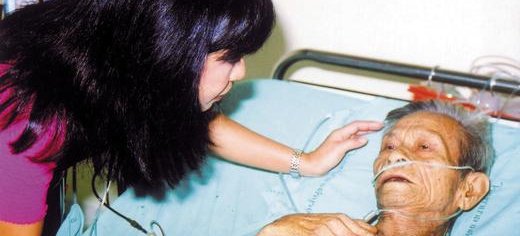
Ange comforting a survivor.




In early August, heavy rains in northeastern Thailand triggered a series of flash floods, claiming over 150 lives, injuring hundreds, and leaving thousands displaced. Volunteers from several Family International communities in Bangkok were quick to join the relief effort in Nam Khor, Petchaboon province, where most of the loss of life took place.
Ten days later, a second team from The Family International in Bangkok went to offer more encouragement to the survivors of the Nam Khor floods. That team included two members who are celebrities in Thailand for their lukthoong singing.
(Lukthoong is a form of traditional Thai country music. Jonas—a Family volunteer who grew up in Thailand—has topped the music charts with his lukthoong CDs, made numerous public and TV appearances, and been the subject of feature articles in national and international newspapers and magazines.Lukthoong also happens to be from the area where the floods and mudslides occurred.)
Also on that second Family team to Nam Khor were singer Angelina, three of the dancers who accompany Jonas when he performs benefit concerts or on TV, and a number of other Thai-speaking preteen, teen, and adult Family volunteers. They visited three hospitals, two shelters, and a distribution center.
When they arrived at the first hospital, most of the patients were solemn and withdrawn, but they didn't stay that way for long! The hospital staff gathered nearly everyone into a large room, the performers began their show, and the Lord's Spirit gently reached out to touch and heal hearts.
Patients began to smile and laugh, some for the first time since the disaster. Others burst into tears when Jonas or Angelina took their hand or made eye contact as they sang. Songs such as Peace in the Midst of Storm and Yod Kao (a song in Thai by a Family International composer about not giving up hope) were well-received. "Thank you for coming to wipe the tears of the people of Petchaboon," one woman said as Jonas held her hand.
After the show, the team talked individually with the patients and staff. Nearly everyone had a harrowing story to tell. One boy had been buried in the mud up to his neck for days. He had only been found one day before, dehydrated and weak, but alive. He was 10 years old.
Despite their suffering and pain, the songs had helped people be thankful for what they still had. "Everything I had was destroyed," one woman said. "There is nothing left of my house. I have nothing at all. But I'm thankful because none of my relatives died." Another man who lost his arm said he was thankful to still be alive.
At the second hospital, which was smaller, the team sang for patients and staff in the main sitting room, and then went to the wards to sing and go from bed to bed, talking with the bedridden.
En route to a wat (Buddhist temple complex) where most of the homeless were, the team stopped at a distribution center to sing and pass out tracts. People came running to greet them with hugs and kisses.
At the wat, they found about 500 people living in tents with the few belongings they had been able to flee with or salvage later. The crowd loved the lukthoong songs. The performers left the impromptu stage on the temple steps and melted into the audience, where they danced and sang with the villagers. Again, the crowd was touched by the songs "Peace in the Midst of Storm" and "Yod Kao." People wept every time they sang those songs. By the end of the show, even the most downcast-looking people were singing along and reacting to the music.
One woman burst into tears and said to Rose, "I just want you to know that I'm not crying because I'm sad or because I've lost something, but I'm just so touched that you came to encourage us, that someone still cares about us."
After the show, they spent time talking and praying with individuals and the small groups that gathered around them.
"Lots of people—even famous people—have come here to give us things," one woman told a Family International volunteer, "but they would hardly even touch us. You are the first ones to sit with us, talk to us, sing to us. You've given us so much!"
A reporter from Thai Raht, Thailand's largest newspaper, had been in the audience. He had been in Nam Khor since the floods, and said he was amazed at the transformation that had taken place before his eyes. For the last 11 days, all he had seen was depression and despair. "For the first time, there is a ray of hope in the village of Nam Khor. You've brought life back to the people here, and your singing has brought new hope!"
At the last hospital, the staff said that other entertainers and groups asked to come, but they had refused all of them because they felt the people didn't need frivolous entertainment, but something that would feed their souls. The secretary to the director of the Petchaboon Hospital said, "It's an amazing thing you're doing. We can give people the physical care they need, but there is also the other side—the spiritual side, the emotional side. Today you took care of that, and that is a wonderful thing."
A public health official who had been with the team for most of the day said that the effects of The Family International's visit had gone far beyond what she had anticipated, as it had helped to heal people's spirits and boost their morale, which would also speed their physical recovery.
Originally Published in 2001.